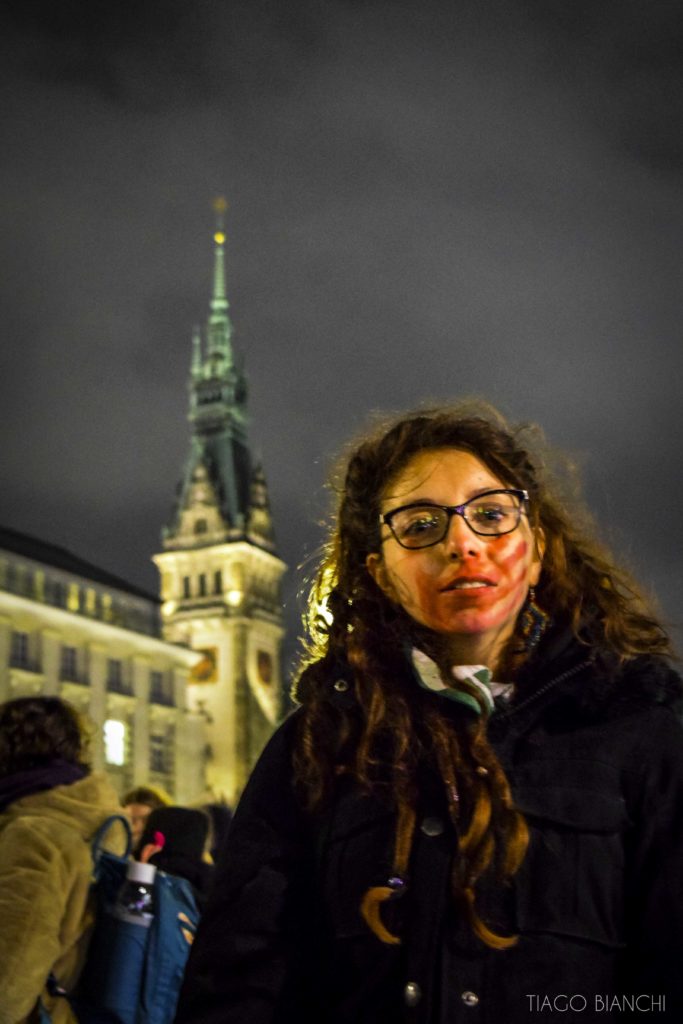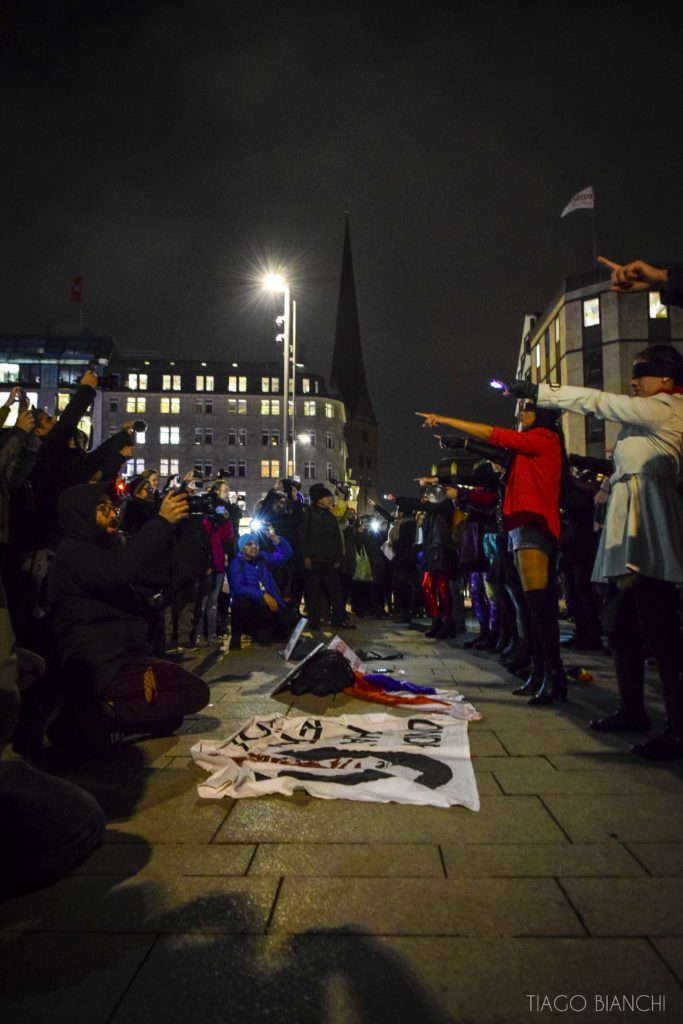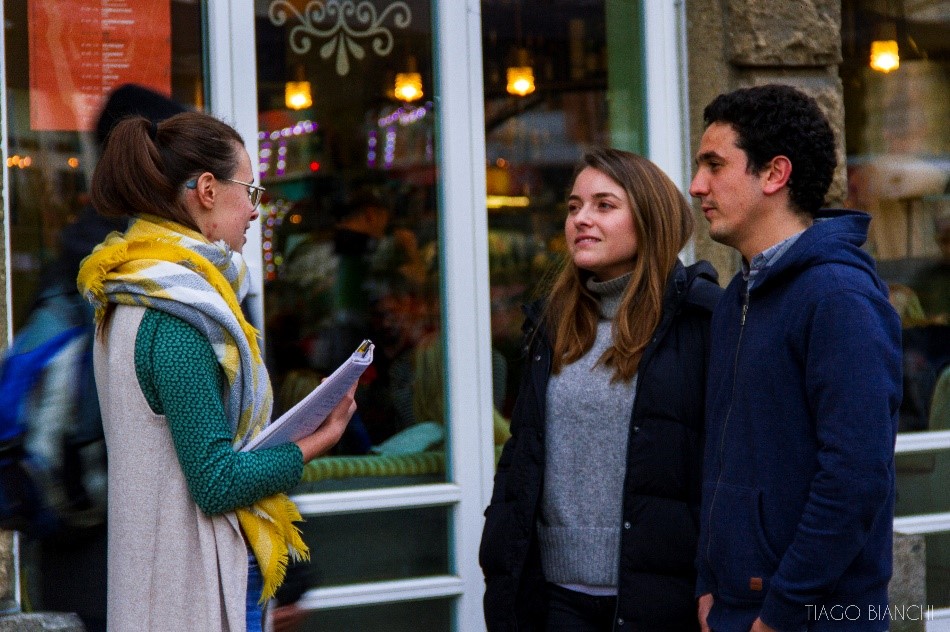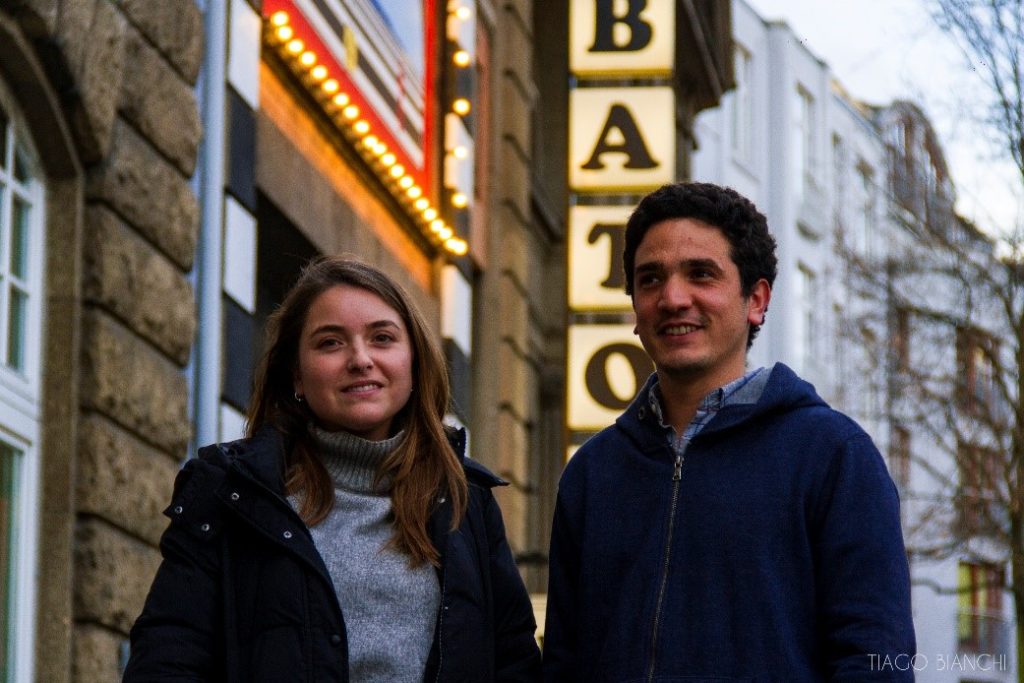
Text: Petra Vrablicová
Photos: Tiago Bianchi
Andrés Velásquez Schwarze is a Chilean journalist with German nationality, who came to Hamburg briefly 5 months ago. I met him and his wife Valentina on an ordinary Tuesday shortly before Christmas. We sat for a coffee on Allende Platz (very symptomatic place for this story) and while everybody else seemed busy with the work or Christmas preparations, we talked about their stay in Germany.
As Andrés mentioned shortly after we started to talk, he and Valentina got married and have been traveling around Europe for a while before coming to Germany. “We came with the expectations to study, but firstly to learn the language,” said Andrés. “Next year we will apply for the University program,” he adds later. Based on the study visa few hundred Chileans come every year to Germany. In the 2018 it was 463 persons according to the latest statistics of the German Federal Foreign Office (Auswärtiges Amt). However, neither Andrés nor Valentina count to those numbers. Their case belongs to the group of spouse reunions (Ehegattennachzug), 140 of which have been granted in the 2018.

Pilar Campo Núñez is a 31-year-old young professional luthier, who came to Germany in 2013. Although, she misses Chile a lot, when she came to Germany, she felt like coming home. (Photo taken by Tiago Bianchi, 3.12. 2019)
When I firstly saw Pilar, she stood in front of the Europa Passage in Hamburg city-center with a red color print of hand on her face and a pan in her hand. She reproduced the tempo while singing with other dozens of women the Chilean feminists anthem “A Rapist in your Path” (“Un violador en tu camino” – original name, the author´s note) both in Spanish and in German. It was one of the freezing evenings in early December with the strong wind near to Binnenalster, but it didn´t mean anything to the women protesters, maybe only that they need to sing with a bit more strength.
Pilar Campo Núňez is a 31-year-old young professional luthier (Geigenbauerin), who came to Germany in November 2013. In her own words, she has never had any problems with integration “probably also because my situation was so different, in my studies, in my profession, in which I am gaining knowledge here in Hamburg.” For her, to get on well with the master of her atelier was the most important point, because they are supposed to work together from ten to fifteen years.
According to Chilean consul in Hamburg Mr. Erwan Varas, there are three main groups of migrants coming to Germany from Chile. Those are mainly students (463 persons with a study visa in 2018); professionals (748 persons with work permission in 2018) and the old generation of migrants that came to Germany mainly in the ’70s. In that time, Chile was under the military dictatorship (1973-1990) and therefore, people coming to Germany considered mostly as political refugees. The second big wave of migration from Chile happened then in the ’90s. This group consisted of the refugees, who left the country because of the economic reasons, and the professionals. In his opinion, this wave was a presage of the current trend.
Andrés Velásquez Schwarze and his wife came to Germany from Chile in July 2019. They plan to apply to University and stay here for at least 4-5 years (Photo taken by Tiago Bianchi, 17.12. 2019)
The general integration for Chileans as Andrés, Valentina or Pilar wasn´t so difficult according to their own words. The main challenge for them was the language. “I think the main difficulty for us is the language but most of the people speak English….” said Valentina. She appreciates how multicultural Germany is. “It is not possible to see it so often in Chile… The integration of people here is very natural… I´ve never felt discriminated by the people here. I think they are very interested because when they know that you are coming from abroad, they always ask where you are from, why you are here and if you like it here.” However, while talking, she also realizes that they are not so well connected with the German people and culture, because the majority of their friends is from different parts of the world. She has a limited possibility to get in touch with Germans because she works with children. Therefore, she is mostly in touch with their families, which are German as well as foreigners. On the other hand, Andrés currently works in a restaurant with majority of German colleagues.
For Pilar, it was a little bit different. Her main expectation before coming to Germany was to feel like a tourist. “It was my first travel. First travel on the airplane, first travel outside of Chile, so I wanted to feel like a tourist. And I felt like home! It was so strange! I didn´t understand anything about what they (Germans) say, but yes, it was as I would be born here… almost.” She didn´t have many ties with the Chilean community in Hamburg until November 2019, when she felt the need to help in one way or another and reflect on the situation in her homeland. It happened at the same time when the whole community started to converge and organize itself more. As one of their activity, the Chilean community in Hamburg organized a series of protests to support the Chilean feminist movement against violence against women, that started on the 3rd of December in front of the Europa Passage in Hamburg and continued through December 2019 in different places in Hamburg. As Chilean media as El Mercurio or La Tercera as well as international media as The Guardian and others informed, the movement started on 20th of November in Valparaíso, Chile, from where it quickly spread around the world to the capitals as Paris or Berlin as well as to other cities with Chilean communities as Hamburg.

This photo is depicting part of the performance and protest that took place in front of the Europa Passage in Hamburg on 3.12. 2019. The protest was part of the Chilean feminist movement bringing attention to the topic of violence against women in Chile. (Photo taken by Tiago Bianchi, 3.12. 2019)
But this is not the first wave of protests to support Chileans and Chile itself in the history of Hamburg. The citizens, people around the Chilean community as well as Chileans themselves were very active already in the early ’70s. Thus, the Chilean Solidarity Committee (Das Chile-Solidaritäts-Komitee) was established on 28.9. 1973 before the first political refugees came to Hamburg in 1974.
Thanks to the solidarity, continuing organization of events, demonstrations and other actions to help to integrate Chileans in the Hamburg society, the support for this movement spread across the city. However, an enormous part of the work stood on the volunteers. One of them was also Angelika Kaute, in that time 24 years old student, who even interrupted her studies for one year in order to have adequate time for Chileans. As she explains: “The solidarity movement here was very strong, when the military coup started,” and continues: “The movement was formed from one day to another. In the moment when the Chileans came … we established a little group of solidarity that consisted of the people from different organizations and private persons. But all with the clear antifascist aspect.”
| “For some Chileans, it was possible to find refuge in foreign embassies during the coup and shortly after the coup in Santiago. Later on, the military dictatorship issued a decree that made it possible to change a concentration camp or prison sentence into external exile. Besides other countries (like especially the DDR) the Federal Republic of Germany gave asylum to such Chilean refugees. Up until 1979, 2,700 refugees from Chile entered Germany, from which some got to Hamburg.” |
This text is part of the publication “Solidarity makes courage” that was published as a part of the historical memory project with the same name supported by the Authority for Labor, Social Affairs, Family and Integration (Behörde für Arbeit, Soziales, Familie und Integration). The project was aimed at the historical memory about the solidarity in Hamburg with the resistance against the Pinochet´s regime. It included several interviews with persons who have been active in the movement, exhibition with the photos of Michael Meyeborg and the publication. All the texts presented there were prepared on the basis of memory and the written documents from the time. This part is a free translation of the original German text.
Next to the Ms. Kaute is sitting Eduardo Astorga, Chilean who came to Germany in 1976. He was imprisoned. The military government, under pressure from the Solidarity movement and international organizations, decided to expel some prisoners. “We didn´t chose the country where to go.” Somebody was doing a work for you without knowing it. You could have some information that it´s happening but the visa could come or not. So, you did´t know where… it could be any country.” explained he broadly. But how he remembers his beginning here, he continues to talk: “When I came… It is not easy… It is difficult. But your advantage is, we say, that you have the freedom. That you can move.”
“When I came… It is not easy… It is difficult. But your advantage is, we say, that you have the freedom. That you can move.”
Eduardo Astorga
Although nowadays the situation is different and most of the Chileans can freely move, the country is again going through the conflict which unites people in Hamburg. However, there can be seen some differences. As described by Angelika Kaute regarding the integration of those two different generations: “There is an enormous difference between then and now. When the military coup started, very strong solidarity movement originated here (in Hamburg).”

Valentina and Andrés Velásquez Schwarze speaking with Petra Vrablicová, author of the article, on Allende Platz (Photo taken by Tiago Bianchi, 17.12. 2019)
Nowadays the movement is led by Chileans, who “organize themselves to collect funds and send them to different institutions that need them,” as described by Pilar. They organize events, where they sell food, sing or do other activities within the community “not only by Chileans to Chileans” with the aim that there is something nice done also for other people “regardless of political color. I think it’s the strongest thing there is… It is a social problem that moves everything,” says she, although there are people who want a political course. However, the main aim of these meetings is to express solidarity and help, as for example to the Faculty of Ontology of the University of Chile, where the help should come from the government in the first place, but it didn´t. Or to the doctors in the first line of the protests in Chile, who help the demonstrators after the clashes with police, asking to respect the rights of protesters to demonstrate and the paramedics to help those, who need it, with respect to their untouchability as doctors.
But when I asked Andrés and Valentina how they feel about the possibility to transmit their experiences living abroad, they answer “it is not possible”. Then they continue: “When we are getting together to protest and support the movement… we Chileans who are living in Hamburg for 5 months with all of those who are living here for years (we should) think about how to build and transmit our message. Because the German system is functioning for this and that different reason…” It is the system ant the trust in the society in that system and people in it that in their eyes makes the difference. “The social habits are those we need to change or remove in Chile… That is the most difficult challenge for Chile now. To achieve the real change means to admit the mistakes made by every single one.” they say.
Those words stayed with me for a while. As a foreigner previously studying in Chile and now in Germany, I could experience on my own some of the differences between the systems they were speaking of. But most importantly I couldn´t stop thinking about those two faces of solidarity and integration I could witness from the words of people I was speaking to. Some coming voluntarily some not, and as described by Mr. Astorga, when some of them were finally allowed to return, it wasn´t a question in place anymore. Despite their struggles during the years without the possibility of contact and return, their integration was complete. With families and children, they continued to fight for a better situation in Chile from here.
___________________________________________________________________________
*Preparation of this article started as Cross-border cooperation under the supervision of the founders Hostwriter.org. The article should be published within the series “Where are you come from”, that was aimed to cover different paths of integration of Chilean, Brazilian and Russian and Spätaussiedler community in Germany with a focus on Hamburg. However, due to the different workloads and manner of work, the authors at the end published three separate articles. “The Path of Solidarity” is an insight into the integration of the Chilean community in Hamburg, Germany.
The Author
Author:
Petra Vrablicová is a journalist currently studying for the Erasmus Mundus master’s degree in journalism, Media and Globalization in Hamburg, Germany. Thanks to this program, she spent 7 months in Latin America, studying at Universidad Católica de Chile followed by an internship in Buenos Aires, Argentina. She holds bachelor’s degree in law and in her work she is focusing on migration, different social groups, minorities, human rights and culture.

